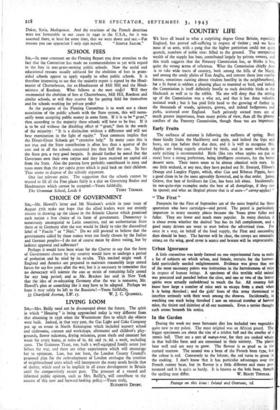COUNTRY LIFE
WE have all heard to what a surprising degree Great Britain, especially England, has proved self-sufficing in respect of timber ; and we have most of us seen, with a pang that the higher patriotism could not quite quench, numbers of noble tree: felled to the ground. The unexpected wealth of the supply has beet. contributed largely by private owners, and this truth suggests that the Forestry Commission has, or thinks it has, quite the wrong terms of reference. What the Commission chiefly does is to take wide tracts of country, both among the hills of the North and among the sandy plains of East Anglia, and convert them into conifer forests, sometimes earning almost virulent hostility in the neighbourhood, for a fir forest is seldom a pleasing place to mammal or bird, and indeed the Commission is itself definitely hostile to such desirable birds as the blackcock as well as to the rabbit. No one will deny that the setting up of the Commission was a wise act, and that it has done valuable national work ; but it has p.aid little heed to the growing of timber in the thousands of woods, spinneys, groves, and indeed hedgerows and parks, scattered over England. Such privately owned trees are of much greater importance, from many points of view, than all the gloomy conifers of the Forestry Commission, though these too are important.
Early Fruits The earliness of autumn is following the earliness of spring. Both those kindly fruits the blackberry and apple, and indeed the hips and haws, are ripe before their due date, and it is well to recognise this. Apples are being eagerly attacked by birds, and in most orchards an early picking is recommended. Birds (like rats when apples are put in store) have a strong preference, being intelligent creatures, for the better dessert sorts. Their tastes seem to be almost id.enti©l with ours_ In one little orchard, at any rate, they have pecked out St. Everard, Ellison's Orange and Langley Pippin, which, after Cox and Ribston Pippin, have a good claim to be the most agreeably flavoured, and in that order. James Grieve, that best of fertilisers for Cox, has been left alone_ Incidentally, its not-quite-ripe examples make the best of all dumplings, if they can be spared; and what an illogical phrase that is of ours—" eating-apples! "
‘, The First " Prospects for the First of September are of the most hopeful for those sportsmen who have cartridges—and petroL The petrol is particularly important in many country places because the 'buses grow fuller and fuller. They are fewer and much more popular. In many districts it is about evens whether the desired 'bus has its full complement, and a good many drivers are wont to start before the advertised time. For once in a way, on behalf of the food supply, the First and succeeding days should be busy. The harvest will be clear, the coveys are unosnally strong on the wing, good cover is scarce and beaters will be unprocurable.
Urban Ignorance A little committee was lately formed on one experimental farm to make a list of subjects on which urban, and female, recruits for the harvest- field particularly needed enlightenment. Evidence was given that one of the most necessary points was instruction in the harmlessness of mice in respect of human beings. A specimen of this terrible wild animal was procured and paraded before the class, and one or two of the braver spirits were actually emboldened to touch the fur. All enmity folk know how large a number of mice seek to escape front a stack when it is being threshed ; and the girls' fears of this army threatened to interfere seriously with their work among the sheaves. Incidentally, in watching one stack being threshed I saw an unusual number of harvest mice, the tiniest and daintiest of all our mammals. Even a terrier thought such atoms beneath his notice.
In the Garden During the week my most fortunate diet has included two vegetables quite new to my palate. The most original was an African gourd. The bigger specimens are about the size of a cricket ball and the smaller of a tennis ball. They are a sort of mange-tout, for they are cooked whole in that ball-like form and are consumed in their entirety. The plants bear well and are easy to grow. The flavour is as good as in the custard marrow. The second was a bean of the French bean type, but the colour is red. Conversely to the lobster, the red turns to green in the cooking. I don't know that it has particular advantages over the French rtmner bean, but its flavour is a little different and more pro- nounced and it is qui:e as hardy. It is known as the kola bean, though • Postage on this issue : Inland and Overseas, id.


























 Previous page
Previous page